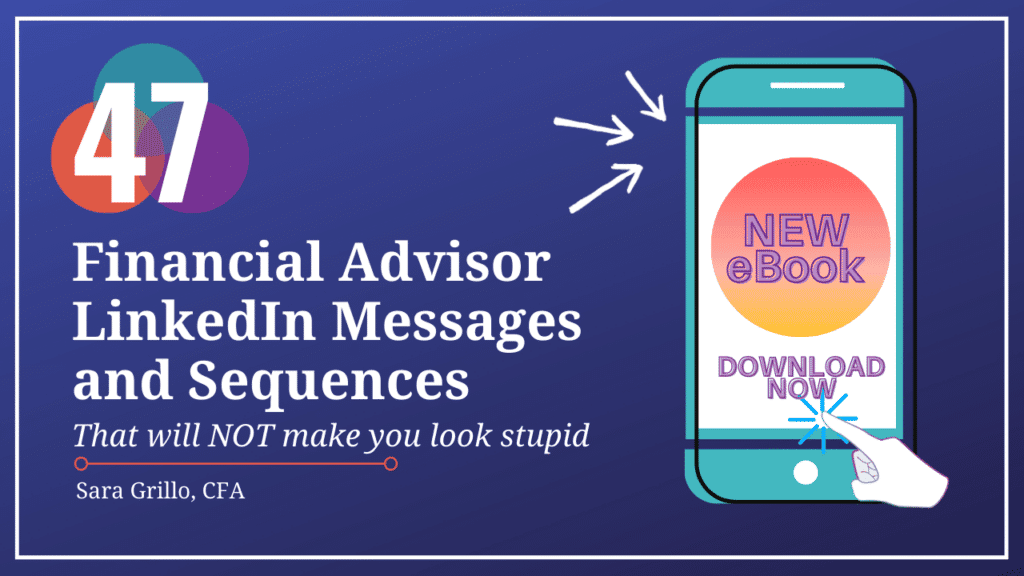Podcast: Play in new window | Download
I got the coolest lawyer in financial services to be a guest on my podcast to discuss the financial advisor SEC testimonial rule and what you need to know about it for 2022. I wrote it up and tried to not make it toooo boring but this is legal stuff, what can I say…
Before we get started, a few things.
- If you aren’t familiar with this SEC marketing rule in its entirety, please refer to our other podcast which goes over all five parts of the rule.
- Nothing in this blog, video, or podcast constitutes legal or compliance advice. For such advice, please consult with your attorney or legal advisor. Each advisor has to company specific guidelines to comply with. Check with your counsel about the compliance requirements you are expected to confirm to.
- This is just a snippet of useful information to know about the SEC testimonial rule. This does not represent the entire body of law pertaining to this mandate.
Okeeeee not that we got that out of the way, can we get started?
Let’s get on with it!
Richard Chen rocks
You may have noticed that Richard Chen is blind.
I actually hate using that word because it has so many connotations that are negative but I don’t have a better term.
It’s an inspiration to see someone with such a challenge who has risen to the heights that he has, working for some of the most reputable firms in our industry, graduating from both Harvard as an undergraduate and for law school, founding his own law firm, and on top of this he is a husband a father to two kids. All of this he does with integrity and humility.
To be fully clear, Rich is my attorney. I’m proud to have Rich as my attorney, I stand behind empowerment of people with such challenges, and I think that all of us in this industry should support giving individuals like Richard a greater voice through podcasts you may be involved with, conferences, and any other means. If you want to learn more about how to have Richard come and speak to your organization, please visit his law firm website.
What do financial advisors need to do know before you start using testimonials?
The SEC has finally permitted financial advisors to use testimonials. This could potentially be a great opportunity to provide people with a sense of what you are like to work with. Let’s start with some legal definitions.
What is a financial advisor testimonial?
According to Rich:
- Testimonial: a client statement about a financial advisor.
- Endorsement: a third-party statement about the financial advisor, not related to a client statement
Don’t forget the disclosures!
There are disclosure requirements, and substantive oversight requirements you have to follow to make sure that people understand potential conflicts-of-interest.
For example, if the person giving the testimonial or endorsement is getting paid, or if there is another relationship that could provide the incentive to provide a positive statement about the advisor. The regulators want the reader to understand that.
No cherrypicking
There are several ways you can go about getting testimonials without cherrypicking. Regulators are very concerned about cherrypicking, so be careful not to do it.
You can solicit comments from clients and other folks ab out you, and they can be posted on a page, as long as there is no altering of those comments. Whether they are positive or negative, if you let the comments be as they are posted, that would be fine.
If an advisor wants to more proactively put out statements that include testimonials or endorsements, that is a little bit trickier. If that happens, the advisor has to make sure there is a fair and balanced presentation.
Fair and balanced presentation
What does that mean?
Here’s what it doesn’t mean. You don’t need to provide an equal number of positive and negative statements. That may not be accurate; an advisor may have an overwhelming number of positive comments.
Rather, the SEC testimonial rule says that you can’t just simply say, “This testimonial or endorsement is not indicative of everything that our clients and others have to say about us.” The regulators expect something that provides a glimpse of a representative view of the advisor.
If there are negative commentaries, they suggest you say on the disclaimer where the testimonial or endorsement lies, something like, “We have other statements about our firm which you can find on our website here.” If that is a representative sample of what the advisor has with respect to statements that have been made about the advisor, that would be okay.
There are other ways of taking care of it. The reality is that if an advisor gets certain testimonials or endorsements, they are going to have to give some sense (if there are negative statements) of what those are at some level.
According to Rich, it’s the bad that comes with the good!
Reasonable belief is needed
Advisor has to have reasonable basis to believe the statements provided are accurate and true. This may be achieved through such means as:
- Talking directly with the folks who made the statements.
- If it is a third party who got the comments from somebody else, verifying that they are accurate.
Statutorily disqualified can not provide testimonials
Somebody is statutorily disqualified if they face a certain regulatory or criminal sanction, under the new SEC testimonial rule. They will not be allowed to provide testimonials or endorsements.
If somebody robbed a bank and went to jail for it, they can probably not provide you with a testimonial, for example.
You can’t win ’em all, folks!
Sooooo….when can advisors start using testimonials?
Effective date was May 2021, but requirement to come into full compliance doesn’t take place until November 2022.
Here’s what the means…
If you want to take advantage of posting these testimonials and endorsements that the SEC rule affords, you have to come into compliance with the entire rule. For most advisors that is going to be quite a lot. Keep in mind that the 2021 SEC marketing rule doesn’t just cover testimonials and endorsements. It has five parts.
For example:
- It encompasses performance results.
- The definition of an advertisement has changed.
- Existing advertisements will have to comply with the new rule.
- Third party solicitors. You may need to revisit agreements with solicitors and potentially enter into new agreements where non-cash compensation is paid. Not only cash, but also non-cash compensation is included. For example, if somebody gets business for you in exchange for use of office space in your office.
Whew!
Okay so here’s where it gets hugely legalistic. If you don’t know the scope of the 2021 marketing rule in its entirety, go back and review the other podcast I did last year with Rich and our crew.
(See other podcast)
Complying with the new SEC testimonial rule
As you can see, complying with this SEC testimonial rule is a heavy lift. If you need some legal help please contact Richard. He’s also great to follow on LinkedIn as he is always posting about legal tips for financial advisors.
Sara’s upshot
What’d ya think? Was this helpful?
If yes…
Learn what to say to prospects on social media messenger apps without sounding like a washing machine salesperson. This e-book contains 47 financial advisor LinkedIn messages, sequences, and scripts, and they are all two sentences or less.

You could also consider my financial advisor social media membership which teaches financial advisors how to get new clients and leads from LinkedIn.

Thanks for reading. I hope you’ll at least join my weekly newsletter about financial advisor lead generation.
See you in the next one!
-Sara G
Richard Chen
Richard Chen is the Founder of Richard L. Chen PLLC, a law firm that serves the investment advisory community (including wealth managers, hedge and private equity fund sponsors, and service providers). Richard provides guidance on compliance matters, including investment adviser registration; compliance program development and implementation; mock audits; and representation in SEC examinations. Richard also advises investment advisers on business formation/structuring, review and drafting of advisory agreements, mergers and acquisitions, employment matters, succession planning, private fund formation, and operational due diligence. Before launching his practice, Richard spent many years at several preeminent law firms including Arnold & Porter, Schulte Roth & Zabel, K&L Gates, and Simpson Thacher & Bartlett after graduating from Harvard Law School and Harvard College. As a blind entrepreneur, Richard is passionate about helping advisers achieve their goals. You can learn more about him and his practice at his website and by connecting with him on LinkedIn.
Disclosures
Grillo Investment Management, LLC does not guarantee any specific level of performance, the success of any strategy that Grillo Investment Management, LLC may use, or the success of any program.
Nothing in these materials may be considered legal or compliance advice. For legal or compliance advice, consult a legal advisor.
Grillo Investment Management, LLC will strive to maintain current information however it may become out of date. Grillo Investment Management, LLC is under no obligation to advise users of subsequent changes to statements or information contained herein. This information is general in nature; for specific advice applicable to your current situation please contact a consultant or advisor.
Music is Nice to You by the Vibe Tracks





